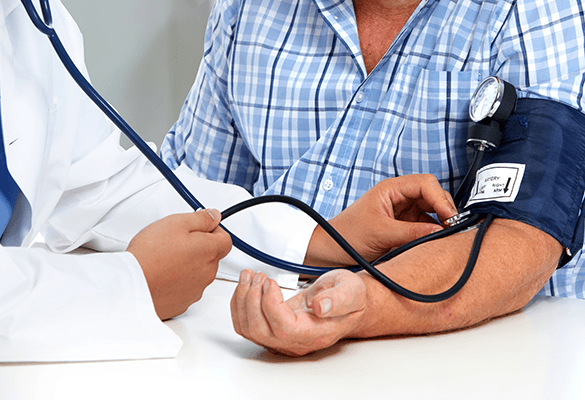How Can I Reduce My High Blood Pressure (Hypertension)?
Hypertension, also known as high blood pressure, affects about half of adults in the United States. Hypertension may not initially cause noticeable symptoms, so you should regularly monitor your blood pressure. Normal blood pressure levels in adults fall under 120/80. The first number is systolic blood pressure. This number measures the pressure in your arteries as your heart beats. The second number refers to diastolic blood pressure. This measures the pressure in your arteries as your heart is resting. According to the American Heart Association, you are considered to have high blood pressure/hypertension when your systolic value is over 130, and your diastolic value is over 80.
If you are experiencing headache, shortness of breath or nosebleeds that can indicate severely high blood pressure. These symptoms may require emergency medical services. Hypertension increases your risk for other serious health complications like heart disease, stroke, aneurysms, and dementia. High blood pressure can damage your arteries and limit your oxygen and blood supply. Unchecked high blood pressure may eventually lead to poor memory and reduced brain function. To discuss or test your blood pressure levels, please schedule an appointment at our office today.
If you suffer from hypertension, normal blood pressure levels can be achieved through lifestyle changes. To help reduce your high blood pressure you can incorporate:
● Regular exercise. Increasing your exercise and activity levels will strengthen your heart, allowing your blood pressure to lower as it takes less effort to pump blood. Exercise can also help to reduce weight. If you are overweight, losing the extra pounds will help stabilize blood pressure levels. Regular exercise will also help with stress management, an important component of achieving a normal blood pressure.
● Stress Management. Strategies to reduce stress can include meditation and breathing exercises, counseling, or even your favorite hobbies. Listening to soothing music, spiritual counsel, and seeking out laughter can also help. Our world has gotten increasingly stressful and demanding, so it’s important to find tactics that work for you and your lifestyle.
● Diet Change. Changing your diet to limit sodium and increase potassium can help mitigate hypertension. Some potassium rich foods include kidney beans, bananas, sweet potatoes, avocados, among others. Reducing or eliminating alcohol and caffeine consumption is also proven to improve blood pressure levels. You may also consider diet change to help with weight loss.
● Eliminate tobacco use. Smoking causes temporary spikes in blood pressure. Tobacco use can damage your blood vessels, increasing inflammation and narrowing your arteries. When your arteries are constricted this increases blood pressure as the blood flow is reduced.
These strategies are just some that have proven effective to reduce your high blood pressure. As always, contact your doctor or call Shenandoah Community Health Clinic if you would like to be checked or treated for hypertension.



 Shenandoah Community Health Clinic does not discriminate based on race, color, national origin, religion, sex, gender identity (including gender expression), sexual orientation , disability, age, marital status, family/parental status, income derived from public assistance programs, political beliefs, or reprisal or retaliation for prior civil rights activity, in any program or activity funded by USDA Rural Development.
Shenandoah Community Health Clinic does not discriminate based on race, color, national origin, religion, sex, gender identity (including gender expression), sexual orientation , disability, age, marital status, family/parental status, income derived from public assistance programs, political beliefs, or reprisal or retaliation for prior civil rights activity, in any program or activity funded by USDA Rural Development.

